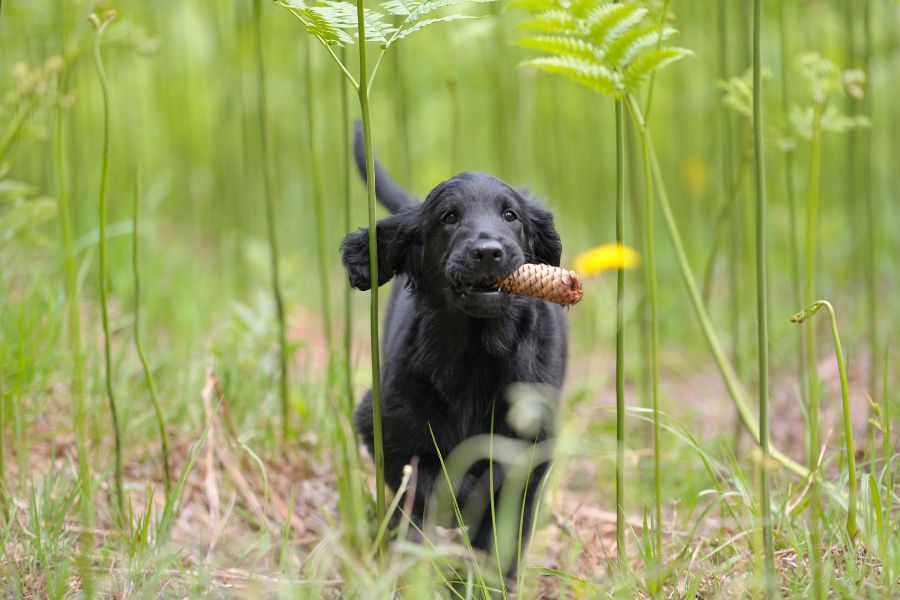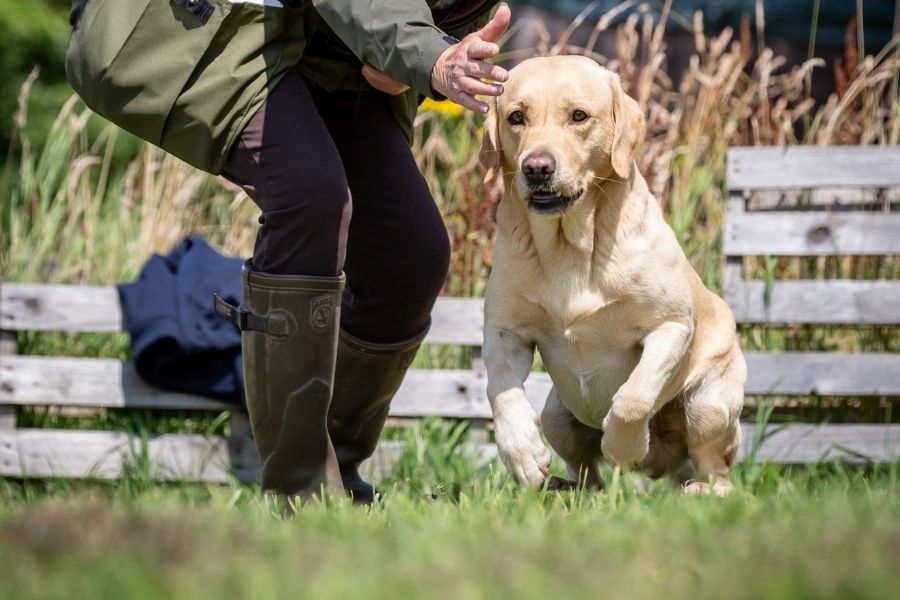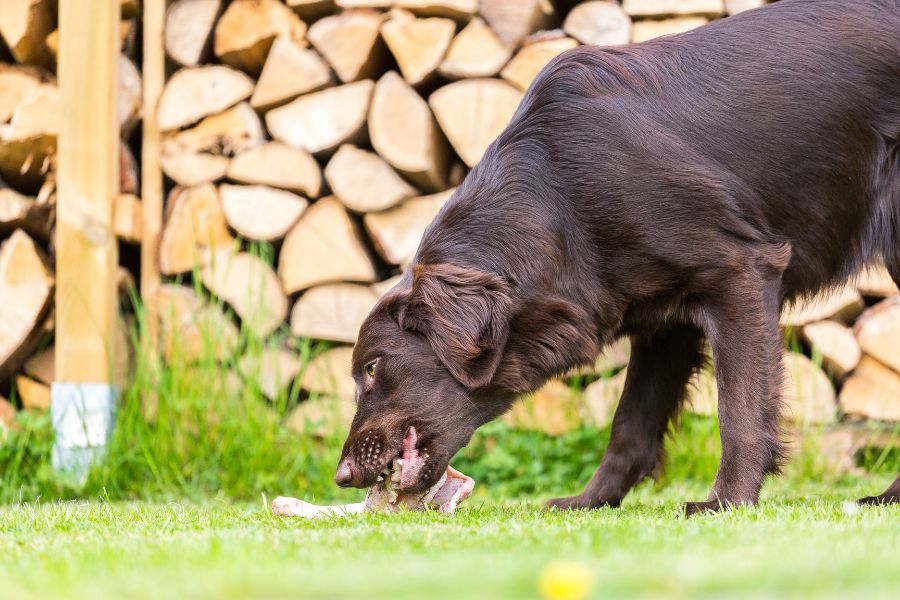If you’re like most people, you probably think of your dog trainer as a kind of magical being. Someone who can wave a wand and make your naughty pup behave perfectly. In reality, training dogs is much more work than that – and your dog trainer wishes you knew that it’s a long process that you can succeed at.
In this week’s podcast episode LWDG Group Expert Clair Denyer and her husband, LWDG Featured Expert John Denyer take us through the ten things your dog trainer wishes you knew about training dogs.
This episode celebrates our first year of LWDG POD DOG, and we would like to thank each and every listener and contributor for making it a brilliant adventure!
Podcast Episode:
10 Things Dog Trainers Wishes You Knew About Training Dogs
Breed Traits Are Important
As any dog lover knows, each breed has its unique set of traits. These traits result from centuries of selective breeding and play an important role in determining a dog’s temperament and behaviour.
For example, herding dogs were bred to work closely with humans, and as a result, they tend to be loyal and obedient. On the other hand, hounds were bred to hunt independently and tended to be more independent and stubborn.
Understanding a dog’s breed traits is essential for choosing the right dog for your lifestyle. It can also help you understand your dog’s behaviour and temperament and provide insight into how best to train and care for your four-legged friend.

There is no race to train your dog
Training your dog can be a fun and rewarding experience for both of you. It’s a great way to bond with your four-legged friend and help them learn basic obedience skills.
And contrary to popular belief, there is no rush to train your dog. Puppies, in particular, are still learning about the world around them and need time to adjust to their new home and family. So, take your time and enjoy the process.
Training should be a positive experience for both of you, so don’t hesitate to give plenty of praise and treats along the way. With a little patience and love, you’ll be amazed at what your dog can learn.
Further Listening/ Reading:

Overtraining can create boredom.
Training your dog can be one of the most rewarding experiences you can have as a pet owner. Not only does it give you and your dog a chance to bond, but it also helps your dog to stay healthy and well-behaved. However, it’s important not to overdo it.
Just like humans, dogs can become bored if they are made to do the same thing repeatedly. This can lead to poor performance during training sessions and even behavioural problems.
To keep your dog interested in training, make sure to mix up the routine and provide plenty of opportunities for playtime and exploration. By giving your dog a well-rounded life, you can help to prevent boredom and ensure that training is always enjoyable for both of you.

Quality is more important than quantity.
As any dog lover knows, training is essential for a well-behaved pet. But many people don’t realise that quality is more important than quantity when it comes to dog training. That’s because dogs learn best when given short, frequent sessions focused on a specific behaviour.
So instead of one long weekly training session, it’s better to break it up into several shorter sessions throughout the week. This way, your dog will have a better chance of retaining what he’s learned and will be more likely to respond positively to your commands. Plus, the more you work with your dog on his training, the closer you’ll become – and that’s something every dog lover can appreciate!

Tell the truth, the whole truth and nothing but the truth
When you’re looking for a dog trainer, it’s important to be honest about your dog’s behaviours and temperament. After all, the trainer can only help your dog if they know what they’re working with. So, tell the truth about your dog’s good points and bad points.
Be honest about any aggression issues, separation anxiety, or other behavioural problems. And don’t forget to mention any obedience training that your dog has already had. The more information you give the trainer, the better they’ll be able to help your dog – and you! – succeed.
It also means being honest about your own expectations and abilities. After all, the trainer can’t help you if they don’t know what you’re struggling with. So, if you’re ready to get the most out of your training, be sure to tell the whole story.

Equipment tools aren’t dangerous; the people using them are
As any dog lover knows, our four-legged friends need exercise, mental stimulation, and plenty of love and attention. Training is one of the best ways to provide all of these things.
Training strengthens the bond between dog and owner and can also help prevent problem behaviours from developing. While some people may be concerned about the use of equipment in dog training, the truth is that it isn’t the equipment that’s dangerous – it’s the people who use it badly.
When used correctly, equipment such as harnesses, leashes, and rewards can be incredibly helpful in teaching dogs new behaviours. The key is to use them safely and effectively, keeping your dog’s well-being at the forefront of your mind at all times. With a little knowledge and care, you can make dog training a fun and rewarding experience for you both.

Socialisation needs structure
If you’re a dog owner, you know that socialisation is key to having a happy, well-adjusted pup. But what does socialisation really mean? In short, it’s the process of getting your dog used to different people, animals, and environments.
Dogs are social creatures that need to interact with other dogs and people regularly to stay happy and healthy. However, not all socialisation is created equal.
For example, letting your dog off the leash at the local dog park can be a recipe for disaster. Your dog may be anxious or aggressive, and he or she may also pick up bad habits from the other dogs at the park.
Instead, socialisation should be structured to allow your dog to interact safely and calmly with other dogs and people. This can be done through obedience training classes, play dates with well-socialised dogs, and positive reinforcement.
While puppies typically start socialisation around 3-4 weeks of age, it’s important to continue socialising your dog throughout their life. Dogs of all ages can benefit from meeting new people and animals and exploring new places.
There are a number of different ways to socialise your dog. One easy way is to take them for daily walks in different neighbourhoods or parks. This will help them get used to different types of people and animals, as well as new sights and smells. The most important thing is to do it gradually and at your dog’s own pace. Let them approach new people and animals when ready, and don’t force them into situations that make them feel uncomfortable.
With some patience and effort, you can help your dog learn to love the world around them – and have a lot of fun in the process!
Further Reading/Listening: Why Socialisation Of Your Dog Is Essential

Saying No is not abuse
No is not a bad word. In fact, it can be one of the most important words you ever say to your dog. While it may seem like you’re being mean when you tell your dog no, in reality, you’re setting boundaries and teaching them what is and isn’t acceptable behaviour. And that’s critical for a happy and healthy relationship.
Just like small children, dogs need to know what they can and can’t do. Saying no helps them understand these boundaries. It also lets them know that you love them enough to correct them when they make a mistake. So the next time you feel guilty about saying no to your furry friend, remember that you’re actually doing them a favour.
Further Reading/Listening :
Positive -Only V PunitiveTraining: What happened to the middle ground?
The Science Behind Correction- How To Correct Constructively

Your dog trainer genuinely cares.
You can tell a lot about a person by how they treat their dog. A good dog trainer will have a deep understanding of canine behaviour and will be able to help you develop a trusting, rewarding relationship with your dog. They will be patient and gentle with your dog and will take the time to understand their individual needs. They will also be honest with you about what you can realistically expect from your training sessions.
Most importantly, a good dog trainer genuinely cares about you and your dog. They will want you to succeed and be there to support you every step of the way. With their help, you can overcome any challenges you face and develop a strong bond with your four-legged friend.

Your dog is not deaf, so there is no need to shout.
In fact, studies have shown that dogs can hear frequencies up to four times higher than humans. However, dogs don’t always react to sound in the same way that humans do. For example, a dog’s hearing is much more sensitive to high-pitched sounds, such as a whistle or squeaky toy. As a result, Dogs may not always react to our voices in the way we expect. But that doesn’t mean they’re not listening.
Though we might think they’re deliberately ignoring us when they don’t come when called, for example, more often than not, it’s simply because they haven’t understood what we want them to do.
Dogs rely on both visual and auditory cues to communicate with us, so if we want them to really understand us, it’s important to use both channels. That means using hand signals alongside verbal commands and being conscious of the tone of our voice.
When we shout at our dogs, they can interpret this as a sign of aggression and become scared or defensive. Dogs are attuned to the tone and inflexion of our voices and can often understand what we’re communicating, even if we’re not using words. So the next time you want to get your dog’s attention, try using a gentle tone of voice instead of shouting. And make sure they understand what you are asking. You might be surprised at how well they respond.
Which have these ten things have made a difference for you? Comment below
Join Our Online Community!
Jump on our email list for free tips and insights delivered to your inbox monthly. No spam - just quick bites of value.

